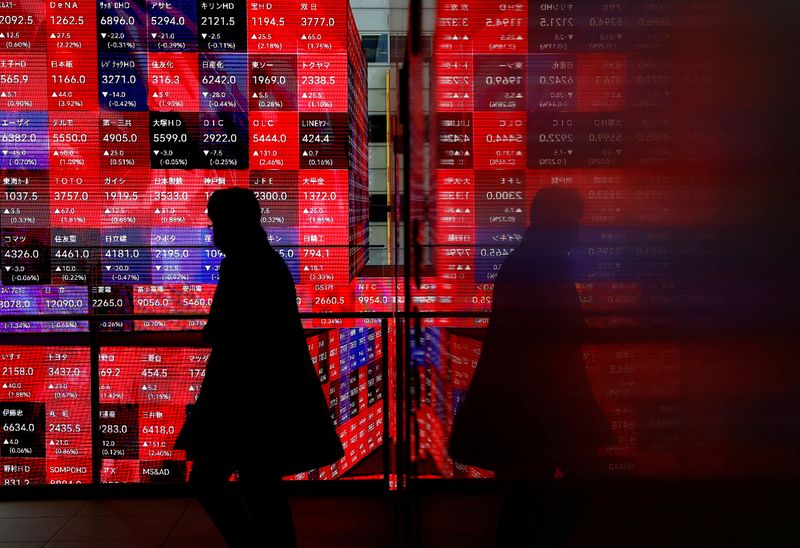By Herbert Lash
NEW YORK (Reuters) -A gauge of global equity markets lost steam on Friday but still set a new high amid optimism over Nvidia's potent results, while Treasury yields fell as the market bet that the Federal Reserve will not cut interest rates until at least June.
Wall Street mostly extended gains as Nvidia briefly shot above $2 trillion in market value for the first time, driven by the AI frenzy that has gripped investors since the chipmaker's blockbuster quarterly earnings report two days earlier.
Nvidia's shares jumped 4.9% to a high of $823.94, before paring gains to close up 0.4%. Investors worry valuations may be stretched after a rally that has lifted the S&P 500 more than 7% so far this year, but are optimistic about the profits companies may gain from artificial intelligence.
"We don't see that much more upside from current levels," said Solita Marcelli, chief investment officer Americas at UBS Global Wealth Management in New York.
"But we have to acknowledge that over the last year we have been consistently positively surprised by the enormous profit growth for some of the AI-leveraged companies," Marcelli told Reuters, adding that better-than-expected inflation could prompt the Fed to cut more than expected.
Data that showed U.S. services sector growth picked up in January as new orders increased and employment rebounded to help equity markets advance, though a measure of input prices rising to an 11-month high added fodder to fears of sticky inflation.
MSCI's all-country world index, a gauge of stock performance worldwide, closed up 0.1% after earlier hitting to a new intraday high.
The combination of strong growth and inflation not yet slowing to the Fed's 2% target has led Fed officials to push back on rate cut expectations.
The strength of the labor market has unequivocally emboldened the Fed to be more relaxed about keeping rates high for longer," said Dec Mullarkey, a managing director at SLC Management in Boston.
"So, the Fed is signaling it will be patient and use that runway to let more data roll in and cement the evidence that the economy is well balanced before they adjust rates," Mullarkey said.
Fed funds futures show a 52.6% chance of a cut in June, with a 35.5% probability of no cut, a sharp reversal from bets on Feb. 1 of a 62% chance of a cut in March, according to CME Group's (NASDAQ:CME) FedWatch Tool.
The pan-European STOXX 600 index rose 0.43% to post its fifth straight week of gains and a new closing high. The French CAC40 and German DAX indices also closed at record highs.
On Wall Street, the Dow Jones Industrial Average rose 0.16% and the S&P 500 eked out a 0.03% gain as both posted new closing highs. The Nasdaq Composite dropped 0.28% but all three indices rose for the week, with the Dow up 1.3%, S&P 500 1.7% and the Nasdaq 1.4%.
The dollar was poised to record a weekly fall for the first time in 2024 as investors consolidated positions and sought further guidance on global economies. The dollar index rose 0.029%, with the euro down 0.03% to $1.082. On the data front in Europe, German business morale fell unexpectedly in Europe's biggest economy in December, an Ifo institute survey showed.
German bond yields were on track for their third straight weekly increase as the economic data and central bank officials continued to chip away at investors' hopes for rapid rate cuts by the European Central Bank this year.
Japan's stock market was closed for a public holiday on Friday, but Nikkei futures rose nearly 1%, suggesting Japanese stocks will extend their record run next week.
Chinese shares wobbled between gains and losses. The Shanghai Composite index rose above the psychologically key 3,000-point mark. It is up 4.6% for the week and has bounced about 10% from five-year lows set more than two weeks ago.
Hong Kong's Hang Seng index slipped 0.1%.
Data showed on Friday that China's new home prices fell for the seventh month in January, leaving sentiment fragile as policymakers' efforts to restore confidence in the debt-ridden sector struggled for traction.
A Reuters poll showed that the recent rally in global stocks had a little further to go but they were divided on whether there would be a correction in the next three months.
The two-year Treasury yield, which reflects interest rate expectations, fell 2.2 basis points to 4.692%, while the yield on the benchmark 10-year note was down 7.5 basis points at 4.252%.
The 10-year hit a three-month high of 4.3540% overnight.

U.S. crude futures settled down $2.12 to $76.49 a barrel and Brent fell $2.05 to settle at $81.62.
Gold prices were set for a weekly gain, buoyed by a softer dollar. U.S. gold futures settled 0.9% higher at $2,049.40 an ounce.
